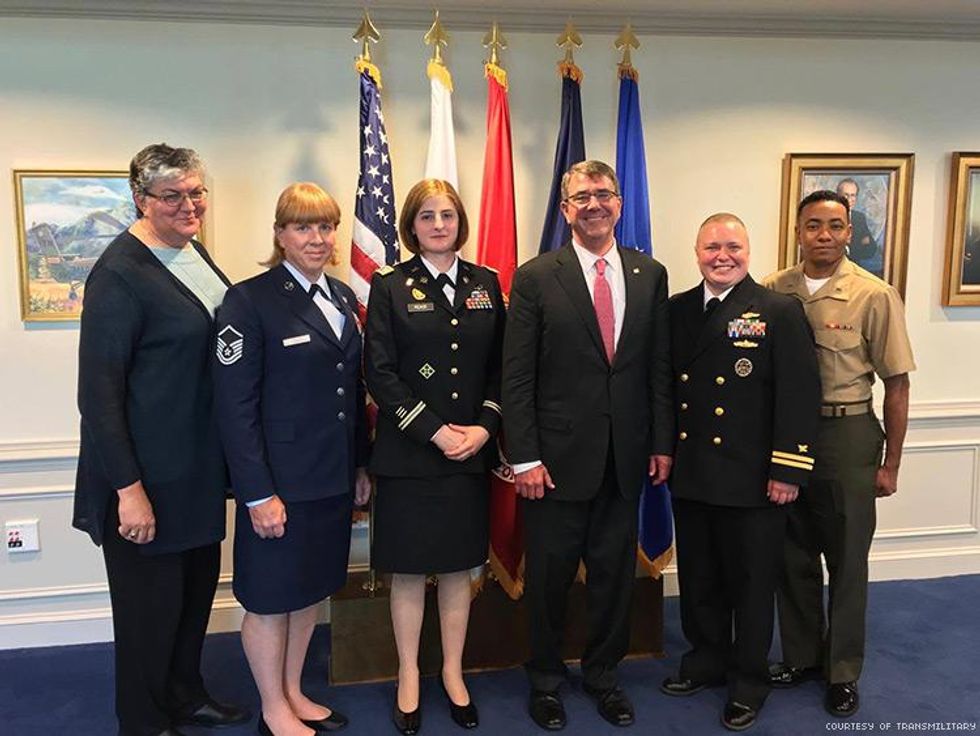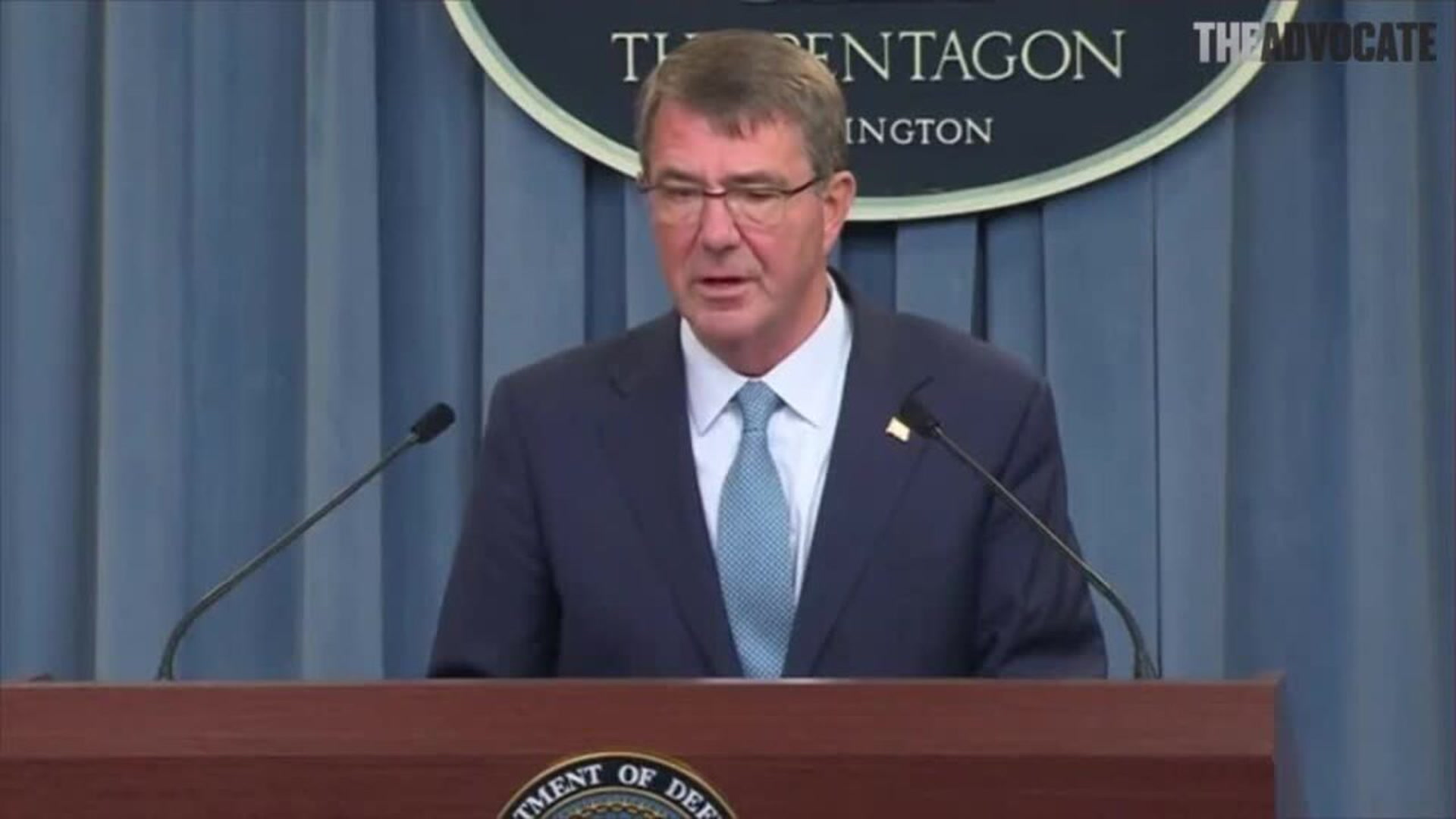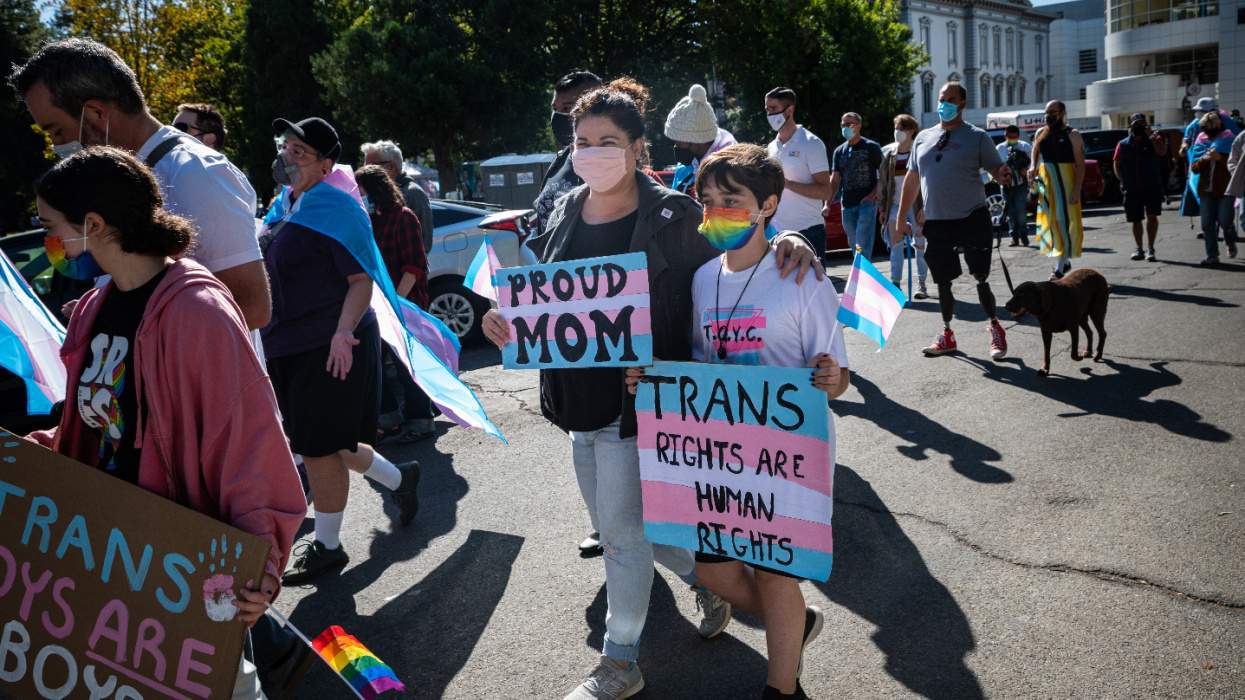The Pentagon today announced the end of the long-standing ban on military service by transgender Americans.
"I am announcing today that we are ending the ban on transgender Americans in the United States military," said Ash Carter, secretary of Defense, in a news conference today. "Effective immediately, transgender Americans can serve openly, and they no longer can be discharged or otherwise separated from the military just for being transgender."
In today's press conference at the Pentagon, Carter outlined three primary reasons why the Department of Defense is lifting the ban, nearly a full year after the secretary announced the creation of a working group to study "any practical impediments" to letting trans Americans serve in the armed forces as their authentic selves.
The first reason, Carter explained, is to ensure the future of the nation's all-volunteer military force.
"The Department of Defense needs to avail ourselves of all talent possible, in order to remain what we are now: the finest fighting force the world has ever known," he said. "Our mission is to defend this country. And we don't want barriers unrelated to a person's qualification to serve preventing us from recruiting or retaining the soldier, sailor, airman, or marine who can best accomplish the mission. We have to have access to 100 percent of America's population for our all-volunteer force to be able to recruit from among them the most highly qualified, and to retain them."
The second reason, Carter noted, was that transgender Americans are "already serving in uniform today." He pointed to a study the Pentagon commissioned from the RAND Corp. that determined there are between 1,320 and 6,630 transgender Americans currently serving in the armed forces, whether on active duty or in the reserves -- out of an estimated 1.3 million servicemembers nationwide. Although trans troops are limited in number, Carter said, "we are talking about talented and trained Americans who are serving their country with honor and distinction."
Carter added that he had met with several active-duty transgender troops over the past year, and heard one resounding message: "They don't want special treatment," he said. "They want to be held to the same standards."

He noted that the nation invests thousands of dollars in each trained service member -- a number that increases as an individual moves up the ranks and becomes an even more valuable member of the force. Discharging or separating a qualified, trained service member simply because of their gender identity is harmful to the military's general readiness, Carter said.
"These are the kind of people we want serving in our military," Carter added.
The final reason, Carter explained, is a matter of principle. It is unfair, he said, to ask transgender service members to lay down their lives in order to serve the country they love. Similarly, it is inconsistent with the military's values prioritizing order and consistency to lack clear, comprehensive guidelines for commanders and medical personnel about how to respect and care for transgender people in uniform.
No later than 90 days from today, the DOD will issue a guidebook for leaders of trans service members and issue medical guidance to doctors who will begin providing all medically necessary transition-related care to trans people currently serving. Under the old policy, transgender troops had to seek transition-related care from non-military doctors, and pay for those expenses out-of-pocket.
Over the following nine months, commanders will begin training their troops about the new policy, in a similar fashion that military brass implemented the 2011 repeal of "don't ask, don't tell," the ban on open service by gay, lesbian, and bisexual Americans.
Within a year, all branches of the U.S. military will also welcome new transgender recruits. If a transgender person wishes to enlist, they must have completed the medical treatment their doctor has determined to be appropriate (which differs for each individual),and "must be stable" in their affirmed gender identity for no less than 18 months.
This standard is similar to the international guidelines endorsed by the World Professional Association for Transgender Health, which generally suggests that a trans person live as their authentic gender for at least a year before they undergo specific gender-affirming surgeries or seek a legal name and gender change.
The question of whether the military will pay for gender-affirming surgery was answered repeatedly during the news conference.
Carter said that currently serving troops seeking gender-affirming surgery would have access to it, and that it will be "a decision they make with their physician." Carter described the surgery as "non-urgent medical care," meaning transgender troops could still be deployed by their commanders without having had gender confirmation surgery.
"We're not going to have any different medical policy for transgender service members than others," he said, explaining that's how it works with cisgender (nontrans) troops now. "Our doctors will treat them, give them medically necessary treatment according to the protocols that are determined by the medical profession," Carter explained.
Carter also confirmed that gender identity would be added to the military equal opportunity policy, which acts like an antidiscrimination policy. He repeatedly affirmed that gender identity alone will no longer be a reason for an otherwise qualified American to be turned away from military service, or separated from active or reserve duty.
"Secretary Carter today fulfills his promise that every American who is qualified to serve will be allowed to serve, said former Army Capt. Sue Fulton, president of LGBT military advocacy group SPARTA. "The thousands of transgender soldiers, sailors, airmen, marines, and Coast Guardsmen -- and their commanders -- have one less burden on their shoulders today. We are grateful to the military and civilian leaders in the Department of Defense who worked so hard to get this right."
SPARTA, which was an active partner in the Pentagon's review process that resulted in open trans service, has also created a Transgender Policy Implementation Guide for service members, authored in large part by Navy veteran and Advocate contributor Brynn Tannehill.
"As a retired Army sergeant major, Airborne Infantry, and a transgender woman, I am proud of our leadership and our Armed Forces today," added SGM (retired) Jennifer Marie Long in SPARTA's statement. "Transgender Americans like me are competent, capable soldiers, and now they no longer have to pretend to be someone else."
"I have always been proud to be a Soldier," said Army Captain Jennifer Peace in that same release, "but the inclusion of transgender service members makes me even more proud to serve."
Other LGBT and military groups were quick to celebrate today's historic announcement.
The American Military Partner Association expressed its gratitude to Carter and the Department of Defense for lifting the ban, noting that "military families will be stronger as a result of these critically important and long overdue changes."
"This historic change means that I can finally serve openly and proudly as who I am -- a soldier who loves my country and just happens to be transgender," said a statement from AMPA member Nick Melvin, who is currently stationed in Hawaii. "A huge weight has been lifted off of my shoulder. I can continue serving my nation and support my family, which means the world!"
"Transgender service members have been awaiting this announcement for months and years: it has long been overdue," said Matt Thorn, executive director of LGBT service member organization OutServe-SLDN. "Secretary Carter, with his statement, has given a breath of relief and overdue respect to transgender service members who have been and are currently serving our country with undeniable professionalism, the utmost respect and illustrious courage, with the caveat to do so silently. Today, we mark history, once again, by ending the need to serve in silence. Today, we say (in the words of Attorney General Loretta Lynch), 'we see you,' and regardless of your gender identity we welcome you to serve this country with honor, dignity, courage and above all openly and honestly."
The National Center for Lesbian Rights also welcomed the announcement, calling it historic. "Transgender service members have long served their country with honor and courage," said NCLR legal director Shannon Minter in a statement. "As the repeal of the military's 'Don't Ask, Don't Tell' policy has shown, military readiness is enhanced, not diminished, when our armed forces end discriminatory personnel policies. While some questions about the details of the new policy remain, we hope the armed services will move quickly and decisively to implement the goals of the new policy, which are to permit transgender service members to serve openly and without discrimination."
"Today, we join in celebration with the thousands of brave transgender patriots who will now be able to serve our nation openly and with the deep respect they deserve," said Chad Griffin, president of the Human Rights Campaign, in a statement. "Ending this discriminatory policy not only brings long-overdue recognition to transgender service members, it also strengthens our military and our nation. Our military will now be able to recruit the very best candidates, and retain highly-trained, talented transgender service members once facing discharge for no other reason than who they are. History will remember Secretary of Defense Ash Carter for his leadership in taking this historic and necessary step forward."
"The entire LGBT Equality Caucus thanks the White House and the Pentagon for this historic policy change," said LGBT Equality Caucus executive director Roddy Flynn in a statement today. "The repeal of Don't Ask Don't Tell was an important step forward, but LGBT equality is not complete if the transgender community is left behind. This country has the greatest fighting force in the world because we place readiness and security above arbitrary exclusion or discriminatory policies. Transgender service members should not have to hide their identity to serve their country. For too long these courageous soldiers have been forced to serve in silence. Thanks to this new policy, we will have a stronger, more focused and more just military."
"I am so thrilled that the oldest government agency, the Department of Defense, recognizes the valuable contributions of transgender service members to our country's security and will finally lift the ban on transgender service", Selisse Berry, CEO of Out & Equal Workplace Advocates, said in a statement sent to The Advocate. "Together, we begin a new chapter for the nation and our defense. ... Beyond the DOD, this decision also sends a powerful message to employers and the entire country -- discrimination based on gender identity and expression is unacceptable and not a reflection of our nation's inclusive values."

















Charlie Kirk DID say stoning gay people was the 'perfect law' — and these other heinous quotes
These are some of his worst comments about LGBTQ+ people made by Charlie Kirk.